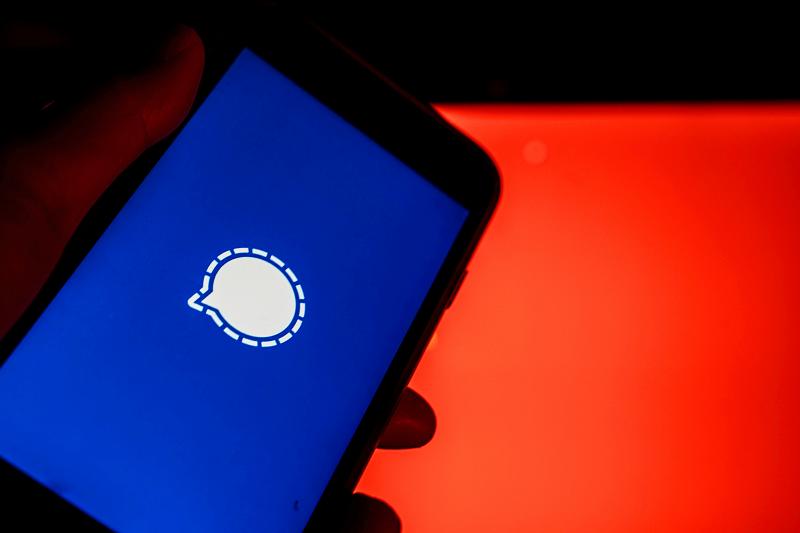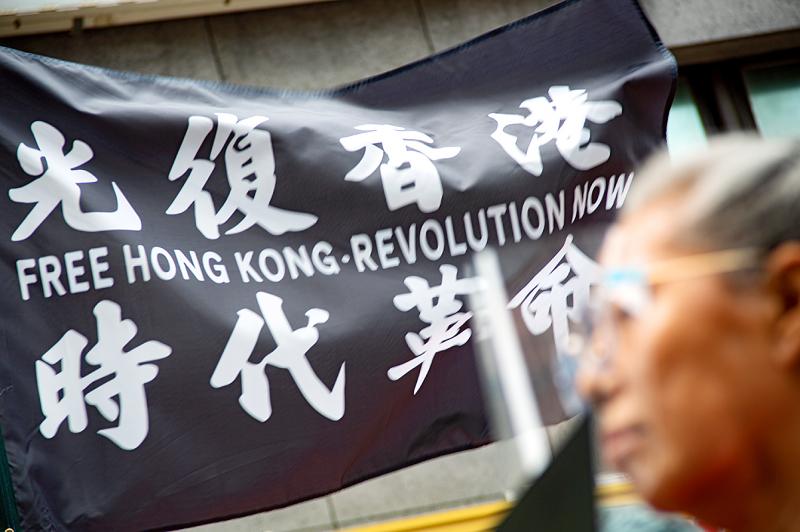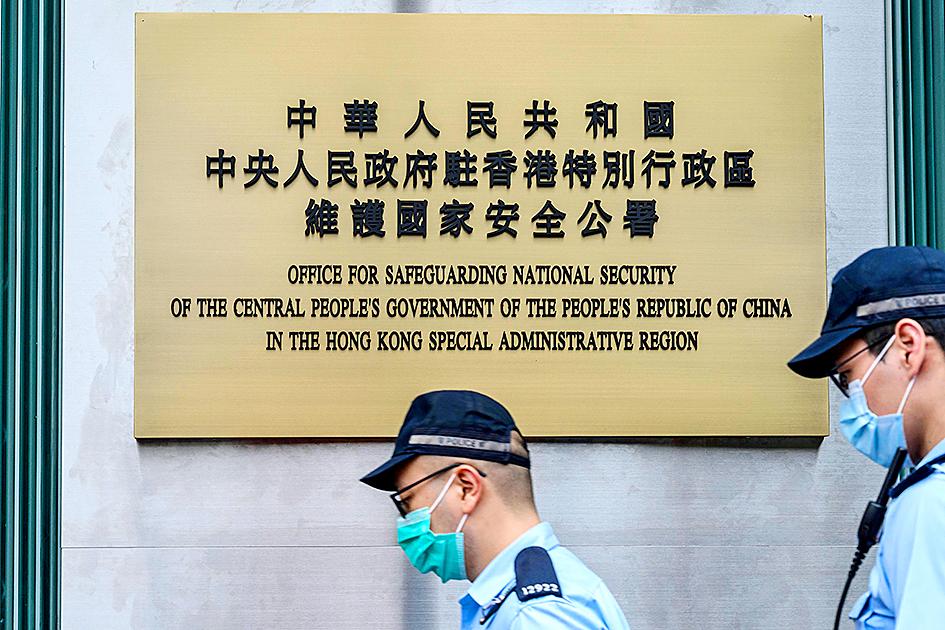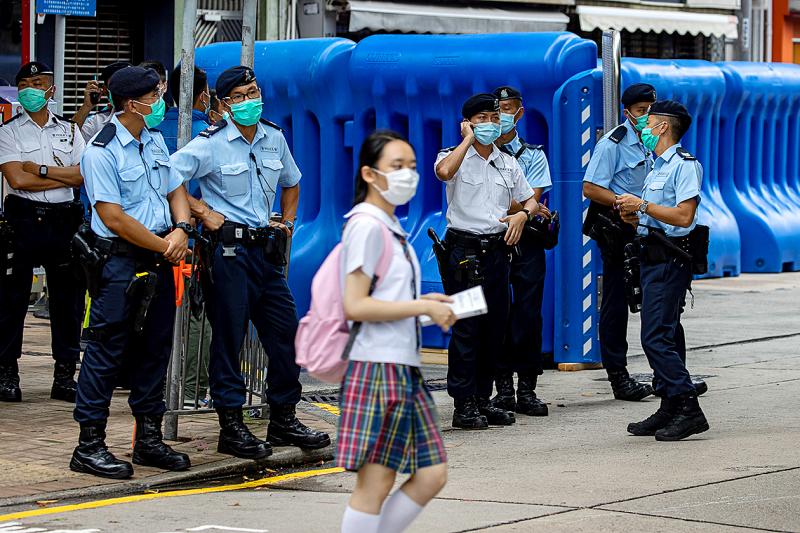Hong Kong’s leader Carrie Lam (林鄭月娥) offered scant reassurance Tuesday over a new national security law that critics say undermines liberties and legal protections promised when China took control of the former British colony.
A year ago, Hong Kong residents felt secure enough in their freedoms under the territory’s “one-country, two-systems” regime to bring their children to mass protests. Now, after the June 30 implementation of the security law, some are worrying they might be punished for what they post on Facebook, Twitter or even TikTok.
Short-form video app TikTok, which has sought to distance itself from its Chinese roots — it is owned by Chinese internet giant ByteDance — said Tuesday it will stop operations in the city “in light of recent events.”

Photo: Bloomberg
Hong Kong was promised 50 years of semi-autonomy after the July 1, 1997, handover. That allowed the city’s 7 million residents to keep a free press and other freedoms forbidden in the communist-ruled mainland.
Many of Hong Kong’s older generations fled political upheaval on the Chinese mainland. Younger Hong Kongers grew up expecting to achieve more democracy in their lifetimes. All are struggling to understand the implications of the new law, which prohibits what Beijing views as secessionist, subversive or terrorist activities or as foreign intervention in the city’s internal affairs.
“I didn’t have a strong view against formalizing a national security law but the way it was implemented is intrusive and disrespectful,” said Jen Au, who works in the banking industry. “It’s basically just bullying. Hong Kong has come a long way in the last 20 years to warm up to China and this really just backfired.”

Photo: EPA-EFE
Lam, the city’s Beijing-backed chief executive, said Tuesday the work of the Committee for Safeguarding National Security she chairs, which oversees enforcement of the law, will not be made public. So implementation rules giving police sweeping powers to enforce the law won’t be subject to judicial review.
Asked if she could guarantee that media can still report freely in Hong Kong without facing censorship, Lam said, “If the Foreign Correspondents Club or all reporters in Hong Kong can give me a 100 percent guarantee that they will not commit any offenses under this national legislation, then I can do the same.”
Hong Kong was convulsed with massive, sometimes violent anti-government demonstrations for much of last year.

Photo: AFP
Initially, the protests were against extradition legislation, since withdrawn, that might have led to some suspects facing trial in mainland Chinese courts. But the protests expanded to encompass calls for greater democracy and more police accountability.
Critics see the security law as Beijing’s boldest move yet to erase the divide between Hong Kong’s Western-style system and the mainland’s authoritarian way of governing.
The new law criminalizes some pro-democracy slogans like the widely used “Liberate Hong Kong, revolution of our time,” which the Hong Kong government says has separatist connotations.

Photo: EPA-EFE
Under the new law police can order social media platforms, publishers and Internet service providers to remove any electronic message published that is “likely to constitute an offense endangering national security or is likely to cause the occurrence of an offense endangering national security.”
Service providers failing to comply could face fines of up to HK$100,000 (US$12,903) and jail terms of up to six months.
Individuals who post such messages may also be asked to remove the message, or face similar fines and a jail term of one year.
Carine Lo, 21, said such rules scare her.
“From now on, whatever public events you take part in, or whatever you say online, you could end up doing something against this law,” she said. “So for us, I feel scared. Probably I’ll have to be more careful about what I say online, and I will watch out if people around me may snitch on me.”
Under the new law, the Hong Kong chief executive can authorize police to intercept communications and conduct surveillance to “prevent and detect offenses endangering national security.”
Police can conduct searches for evidence without a warrant in “exceptional circumstances” and seek warrants requiring people suspected of violating the national security law to surrender their travel documents, preventing them from leaving Hong Kong.
Such vague provisions are worrisome, said Alex Tsui, a woman in her 20s.
“They should tell us Hong Kong citizens exactly in what kind of situations, they have what kind of rights or powers,” Tsui said. “They can’t just choose any time to say, you look suspicious, or accuse you of anything, and then come in to search for evidence, I think it’s completely unfair. It definitely is not going to help uphold justice.”
US Secretary of State Mike Pompeo described as “Orwellian” changes such as the removal of books critical of the Chinese Communist Party from library shelves, a ban on political slogans deemed to be subversive and a requirement that schools enforce censorship.
“Until now, Hong Kong flourished because it allowed free thinking and free speech, under an independent rule of law. No more,” Pompeo said in a statement.
Hong Kong authorities moved quickly to implement the law after it took effect on June 30, with police arresting about 370 people.
Social media platforms, shut out of the mainland by China’s “Great Firewall,” have yet to be blocked in Hong Kong. But users have begun scrubbing their accounts and deleting pro-democracy posts out of fear of retribution. Many shops and stores that publicly stood in solidarity with protesters have removed the pro-democracy sticky notes and artwork that had adorned their walls.
Many experts say they doubt the new law will have a big effect on companies that already operate in both Hong Kong and the mainland.
But big social media companies have announced they are assessing the law. Apart from TikTok, Facebook and its messaging app WhatsApp, Google and Twitter announced they are freezing reviews of government requests for user data in Hong Kong.
Telegram, whose platform has been used widely to spread pro-democracy messages and information about the protests, said it has not shared data with the Hong Kong authorities.

Sept.16 to Sept. 22 The “anti-communist train” with then-president Chiang Kai-shek’s (蔣介石) face plastered on the engine puffed along the “sugar railway” (糖業鐵路) in May 1955, drawing enthusiastic crowds at 103 stops covering nearly 1,200km. An estimated 1.58 million spectators were treated to propaganda films, plays and received free sugar products. By this time, the state-run Taiwan Sugar Corporation (台糖, Taisugar) had managed to connect the previously separate east-west lines established by Japanese-era sugar factories, allowing the anti-communist train to travel easily from Taichung to Pingtung’s Donggang Township (東港). Last Sunday’s feature (Taiwan in Time: The sugar express) covered the inauguration of the

The corruption cases surrounding former Taipei Mayor and Taiwan People’s Party (TPP) head Ko Wen-je (柯文哲) are just one item in the endless cycle of noise and fuss obscuring Taiwan’s deep and urgent structural and social problems. Even the case itself, as James Baron observed in an excellent piece at the Diplomat last week, is only one manifestation of the greater problem of deep-rooted corruption in land development. Last week the government announced a program to permit 25,000 foreign university students, primarily from the Philippines, Indonesia and Malaysia, to work in Taiwan after graduation for 2-4 years. That number is a

This year’s Michelin Gourmand Bib sported 16 new entries in the 126-strong Taiwan directory. The fight for the best braised pork rice and the crispiest scallion pancake painstakingly continued, but what stood out in the lineup this year? Pang Taqueria (胖塔可利亞); Taiwan’s first Michelin-recommended Mexican restaurant. Chef Charles Chen (陳治宇) is a self-confessed Americophile, earning his chef whites at a fine-dining Latin-American fusion restaurant. But what makes this Xinyi (信義) spot stand head and shoulders above Taipei’s existing Mexican offerings? The authenticity. The produce. The care. AUTHENTIC EATS In my time on the island, I have caved too many times to

In a stark demonstration of how award-winning breakthroughs can come from the most unlikely directions, researchers have won an Ig Nobel prize for discovering that mammals can breathe through their anuses. After a series of tests on mice, rats and pigs, Japanese scientists found the animals absorb oxygen delivered through the rectum, work that underpins a clinical trial to see whether the procedure can treat respiratory failure. The team is among 10 recognized in this year’s Ig Nobel awards (see below for more), the irreverent accolades given for achievements that “first make people laugh, and then make them think.” They are not